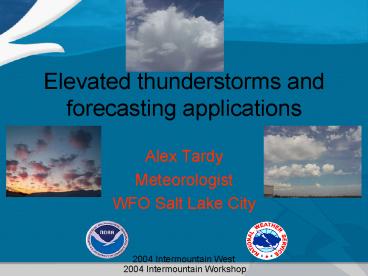Elevated thunderstorms and forecasting applications - PowerPoint PPT Presentation
1 / 24
Title: Elevated thunderstorms and forecasting applications
1
Elevated thunderstorms and forecasting
applications
- Alex Tardy
- Meteorologist
- WFO Salt Lake City
2
Overview for 2 cases
- Showers and thunderstorms produced heavy rain in
northern valleys and deserts of Utah along a
persistent boundary in case 1 - Showers and thunderstorms developed rapidly and
were fast moving in case 2 - In both cases thunderstorms were nocturnal and
elevated above the boundary layer independent of
terrain
3
Case 1Water vapor loop 0300-1500 UTC 3
September 2004
4
GOES IR from 0915 to 1400 UTC 3 September 2004
5
GOES sounder precipitable water
0900 UTC 3 September
6
GOES total precipitable water at 1300 UTC
September
Dry
Clouds
.70
Higher values
7
Eta 500-mb geopotential height, temperature,
omega, wind and relative humidityat 1200 UTC 3
September
Lift
8
0812 to 1539 UTC 3 September 2004 KMTX composite
reflectivity
9
12h NLDN strikes (black) ending 1600 UTC 3
September and topography
10
KSLC 0000 UTC 3 September
LFC
dry
moisture
dry
11
KSLC 1200 UTC 3 September
Dry
ECAPE
LFC
Stable
Moist
12
Case 2GOES sounder total precipitable water at
0600 UTC 19 September
Dry .25 or less
Moisture Advection
13
GOES sounder precipitable water loop
1800 UTC 18 September to 1000 UTC 19 September
14
0605 to 1632 UTC 19 September 2004 KMTX
composite reflectivityRapid development of
thunderstorms
15
GOES water vapor loop 0300 UTC to 1400 UTC
16
Eta 1200 UTC 19 September 250 mb windspeed and
divergence
Max speed
17
Eta 1200 UTC 19 September 500 mb geopotential
height, wind and vorticity
PVA
18
12h lightning from NLDN ending 1400 UTC 19
September 2004Green most recent
19
1200 UTC 19 September
0000 UTC 19 September
dry
Dry
ECAPE
MoistureDeeper
LFC
Steep/dry lapse rate
LFC
moisture
Stable inversion
20
SummaryWhat is needed
- Moisture (mid levels)...higher precipitable water
values advected into the system or already
present - Instability....elevated steep lapse rates
(ECAPE) - Lift...dynamics (DPVA and WAA) to provide
sufficient lift to move parcels closer to the
LFC...further destabilization
21
What happens
- Best lift and moisture advection (south flow)
from a closed upper low or open short wave trof
which also provides upper divergence, across the
east side of the upper low - Random parcel action can reach the LFCwatch the
cloud formations even on marginal days with only
moderate non-surface based cumulus development - The dynamics will further destabilize the column
of air but sufficient moisture is needed (at
least 0.50 inches?). Watch for rapid moisture
advection into drier areas and the resultant
destabilization - Stronger dynamics and sufficient mid-level
instability/moisture lead to organized and more
numerous elevated TCU and thunderstorms
22
Dont need this
- Boundary layer conditions not a factor (e.g.,
dry, low dew points, stable, and frontal,
subsidence or marine inversions) - Terrain can act as added lift to reach the LFC
but is not required - Mid-level outflow boundary from prior diurnal
convection may enhance or provide convergence but
is not needed - Diurnal heating is not a factor but may
complicate the situation with surface-based
developmentas soon as mid to late morning
23
Forecasting applications
- Basic model geopotential height, omega, RH, upper
divergence and vorticity products - Pattern recognition
- Model spatial and sounding precipitable water
- Observed, model and satellite derived soundings,
look for steep elevated lapse rates and moisture
(i.e. elevated CAPE) - GOES precipitable water analysis and trends
- Water vapor trends and ACC (altocumulus
castellanus) on visible or IR images
24
Consequences
- Significant grass and forest fire danger
- Dangerous and unexpected lightning
- Significant rainfall (e.g., on construction
projects) - Agriculture damage due to rainfall
- Missed forecast of rain and lightning
25
alexander.tardy_at_noaa.gov
National Weather Service Salt Lake City































